Inspiring, Although I’d Argue With Wilde Because Immoral Books Don’t Always Show the World Its Flaws
inspiring, although I’d argue with Wilde because immoral books don’t always show the world its flaws but sometimes encourage and multiply them (this was a tough lesson for me as an aspiring writer)







“That is part of the beauty of all literature. You discover that your longings are universal longings, that you’re not lonely and isolated from anyone. You belong.” ~ F. Scott Fitzgerald
“I should like to make life beautiful–I mean everybody’s life. And then all this immense expense of art, that seems somehow to lie outside life and make it no better for the world, pains one. It spoils my enjoyment of anything when I am made to think that most people are shut out from it.“ ~ George Eliot
“Madame, all stories, if continued far enough, end in death, and he is no true-story teller who would keep that from you.” ~ Ernest Hemingway
“The books that the world calls immoral are books that show the world its own shame.” ~ Oscar Wilde
“Writing in English is the most ingenious torture ever devised for sins committed in previous lives. The English reading public explains the reason why.” ~ James Joyce
“A book must be the axe for the frozen sea within us.” ~ Franz Kafka
“Words have no power to impress the mind without the exquisite horror of their reality.” ~ Edgar Allan Poe
More Posts from Bernatk and Others
does the job
Quickly threw this together and it instantly made me feel less anxious so it might help some of you idek
Let me share a secret with you: this is the time of your life. Or there's a very big potential in it. Why? Maybe: how do I know that? Quite simple: It always is. It surely sounds like a common place but let's search through the depths of it.
I'm not trying to express a carpe diem kind of philosophy, for that is most commonly mistaken for the worse. I'm not packing my message into good-sounding witty phrases for those serve little good for the people, who are very quick to scroll down and just consume the easily digestable parts of every post on the site.
Returning to our (maybe it's just "my" but as long as you're reading, we both share this) topic, what is the great deal about today? Or about your life? What grand adventure may await you? We have this concept, that these are the priviliges of exceptional people and maybe it's true. But I'm not asking you to attempt things, that are not meant for you. We are called or more like entitled to be the creators of amazing things. Some of us could be leaders of nations, movie stars, inventors but others bring these incredible things to the world, like being the ever-smiling cashiers or raising well their children. The how is always individually altered and understood, so I really cannot give you specific information. However, none of you need it! Because these ways are spectacular, obvious. Yes, we walk blindly, suffering because of our own ignorance and fear. Be courageous!
I could go on for quite long but I'm gonna stop right here. Because the rest is really up to you. I'm not telling you to find your way, I'm only asking you to look for it.
Frankenstein? You Certainly Have No Idea
A while ago I wrote a similar post about Bram Stoker’s Dracula, where I explored how we’ve gradually departed from the original concept and eventually turned the whole story inside out--the way it’s usually believed to be today.
Horror and genre fiction in general are looked upon as solely entertaining literature. It is best represented by enormous fandoms around horror stories that are really the shallow water of the stream of art--yes, I’m referring to Stephen King.
Although is it not supposed to be more? Shouldn’t horror really be more than a good fright? Obviously I ventured out to write this post because I strongly believe horror can have more profound dimensions and it should. Actually, my opinion is mainly informed by Stoker’s Dracula and Shelley’s Frankenstein (and a good portion is a result of reading Poe extensively in my teen years, as it shows in the post later).
Let me begin by explaining a bit about contemporary horror’s genesis. As a branch of literature it has very little to do with books, it is only an indirect continuation to the tradition. Today’s horror comes from a set of movies, some of which were book adaptations or remotely inspired by them. Actually one name is a recurrent theme here: Bela Lugosi, a.k.a. the king of horror--much more so than anyone would have thought. His version of Dracula has proven more enduring than the written one, so the underlying themes of Stoker’s novel, which even concerned the metaphysical at times, are lost, quite tragically. Also, the popular image of Frankenstein’s monster comes from the 1939 Rowland V. Lee movie Son of Frankenstein. The shape of the creature, its mindlessness, the castle, the assistant--every bit people associate with Frankenstein is a direct result of the movie, hardly any of which actually features in the novel.
A written genre originating from a visual one is encased in the limitations of both--what could not be visually understood won’t appear, and the same applies to the written part. It is an almost unimaginable thing but originally these horror stories barely ever showed the horror. “Why, we have that today,” the ignorant reader might say but the horror of old times was not filled with the today commonplace suspense and disgust elements.
In this post I focus on the method of Shelley in Frankenstein: Her approach was what we would today call the purist. Her novel embodies horror--the dictionary’s definition of it actually. She only ever tells as much about the monster that it exists, reluctantly adding that it’s too hideous to behold and once dropping that its hand resembles that of a mummy. The main instrument of this story is a very long line of deaths but only in the purist spirit, as well.
A prolonged prologue commences with establishing the members of an extended family. They are talented, intelligent, wealthy, charitable people, who are just the dream of the era. After individually stating about every relation how enviable and admirable they are, the monster is briefly introduced. No lightning is involved here, only the statement that Victor Frankenstein, the visionary, somehow figures out how to bestow life upon things and then, once the monster is created, he instantly regrets it and falls into a state of mental breakdown over the realization of how unhallowed his work is. The monster then lives alone for a while, gradually comprehends that he is frightening to humans and feels that he is forced into a perpetual state of solitude, which he loathes more than anything--so much so that he will burn down the entire world if necessary to get himself a companion. And that’s about it. The monster asks Frankenstein to create him a mate but as he refuses he decides to avenge him as the creator of his desperation through killing everyone he holds dear. Enter the death of all characters...
The horror is how Frankenstein watches everyone he loves being killed at the unstoppable hands of his own creation. His guilt and reflections at it are horror. He is horrified. Horrified. He--along with the invested reader--is not exactly startled, nor disgusted, but profoundly horrified.
But there’s more to this story than just being the original horror. I explored that dimension only because of the framework of today’s horrible, genre-redefining novels.
As contemporary horror tries to grasp what visually equates horror, all content is lost. Shelley operates with what Poe designated as the horror-writer’s most powerful instrument: “The death of a beautiful woman, is unquestionably the most poetical topic in the world.” In human relations the most extreme loss is that of one’s child but the loss of someone one loves tenderly comes in as a spectacular second, with a much more elevated pathos.
The reason this is preferred by Poe and a myriad of authors is that a parent-descendant relationship is a natural one, where choice has roughly no role, whereas in a romantic relationship, while having a powerful natural component, active choice is central. This is why a parent losing a child usually goes with the line: “A parent should not live to see their child die,” when a lover’s loss comes with: “They were taken from me.” So, while the first kind of death evokes the more profound pain, the second one is the more aesthetic. It is a better case of antagonism: what one actively binds themselves to, pledges to unite their identity to, is actively deprived from them by a second actor, thus their willing choice for whom they would value most highly in life is irrevocably undone.
The peak is then the death of a beautiful woman but it can only be a real peak if the beauty of that woman is fully realized.
An interesting juxtaposition can be made here between the book’s model and the contemporary one. The book emphasizes multiple faculties, such as intelligence, a charitable nature, intuition and nobility of character, whereas today’s model is derived from the passions of the flesh. Contemporary theories favor a simplifying approach, which marks the core of all traits the sexual of a person. However, Frankenstein is a great example of how it used to be a valid action to discrete the sexual, the intellectual and the emotional. Today it would be called repression of the true motives (the sexual), since all the faculties associated with beauty are just expressions of the deeper, truer core of identity. Feminists of the past would have pointed out that the death of the beautiful woman symbolizes Shelley’s vision of the intelligent, competent woman’s fate, as she is determined to die, even by the principles of literature (or Poe). Today’s most progressive feminists, though, would confine this story to the literal body of women, however, not only a story but women, and all people, are much larger than bodies.
But Frankenstein is not the perfect novel. Whereas it succeeds at many things and has its outstanding merits, it does fail at anticipating what the reader can guess, as Frankenstein misinterprets a supposedly enigmatic line and prepares for his own death, when his soon-to-be wife is threatened. Sadly the target is so obvious that it’s impossible to believe what the protagonist believes to come next but, as I have stated before, this is a completely marginal element of the story and perhaps even Shelley didn’t want to make it a really elaborate twist...
All in all Frankenstein is the beacon of the lost genre of horror. But beside its literary quality it might also be a reminder to the readers that there used to be a way of thinking that thought it possible to abstract from the material.
How to pretend

Pretend you're into certain things and that you're expressly good at them. Display great fondness and commitment. When questioned about it, convince everyone, that you love those certain things because they are truly the greatest of all. Go on figurative and/or literary crusades. Organise everything in your life, so it would be interconnected with tose things. Have hobbies, studies, jobs, that relate to them. Have everybody decieved: trick the world, your co-workers, your best friend, your family, EVERYBODY, including yourself. And at the end of the day, when you have to face those certain things, you'll fail. Because you can't actually do anything that you said you could.
Modern day thinking requires us to rapidly make decisions, even the ones that will determine main matters in our lives. It is not hard to be drifted away to some unknown directions, that look tempting but in fact are alien to us. I believed, that I'd be a great engineer and could set up a huge company, that'll be providing me with a grand fortune but things don't work like this. Not all of us will find what we're looking for in popular careers or good-sounding ideologies.
What I have found though, is that prayer is a highly underrated element of happiness. Wherever I might go, it can always take me home from there. Always. So just be strong enough to kneel down and bring yourself before the Father. :)
Dreamless Generation
This is a generation, which is lacking perspective. Young people coming up are converted into uniformed entities, slaves of a system they don't understand and therefore they hate. Quite shocking, although true.
Without much dramatisation, I can say, that a vast majority of people I know, work jobs they never wanted. It's not neccesary because they are forced to do something they're reluctant to, simply they have no visions of their own. It's fairly disheartening to see, how young people pick careers based on a story they've heard, or what their parents did, or what pays the most or any other common reason why they, or it's customary to say: WE choose this.
First of all there's one particular thing, that needs to be clarified. Experienced (I purposefully don't say wise but more on that later) men often advise not to choose a profession based on emotions but rather on rational thinking. I'm convinced, that even YOU were told this at least once in your life and YOU must have found this to be a great advice. But it's in itself controversial. Why? Because what is called rational thinking is an emotion, named fear. Fear of bankrupcy. When you start out from what you deem to be the safest or most guaranteed way of life is only a desperate choice, trying to provide a trustworthy method to survive. You're just too afraid to move out into uncertainty. Let's stop for a moment, and think, how many people are poor because they've pursued their dreams? Well I don't know but I think less, than the ones attempting to ensure monetary stability...
Whenever you hear your successful relatives, friends, acquintances speak of how they got rich, they tell their stories and you listen with your jaw dropped. When you analyse your life and your opportunities, you found it to be hopeless to do the same thing and even if you have the guts to make the same move, it will almost certainly end in catastrophe because what works out for one, doesn't have to do the same for the other...
After numerous disappointments and probably humiliating situations, you lose your enthusiasm. And when you're the most vulnerable, the predators come: parents, friends, older friends; people, who basically think they have a brilliant piece of mind, that they could share with you to perhaps help you out of your misery (which is, by the way, self-inflicted). They tell you, how you MUST MAKE RATIONAL DECISIONS. Or, TIME TO GROW UP and ACT RESPONSIBLY. But there's nothing savvy in how they try to drive you to fields you're not particularly good at and/or interested in. Yes, it may mean a respectable salary or a family house AT LAST. But it will also, most certainly mean the extermination of the potential that lies within you.
Whenever you get the advice to live by rationality and not to go for you dreams, you're being drifted away from the one and only way of real success. The one, which can provide you a nice fortune, but more importantly a SOUL. And when you truly dedicate yourself to a passion, to your vision, the money, the fear, and the lack of perspective will be gone. Not every dream leads to a million dollar contract in Hollywood but you might want to see the difference between craziness and passion; the second one can always lift you up.
Personally YOU and I are capable of doing the most amazing things. We will be the remembered writers, freedom-fighters, engineers, scientists, singers, and really anything at all. Please, let's not act with disdain toward this. Let us become the people we were born to be.
And a last word to the people with their advices about rationality: I'm not a billionaire-rock-star-secret-agent-astronaut, just a person like you. I can't say I've seen more or I've achieved more. I respect and honour you. BUT I suspect (and I might be wrong (though I'd be surprised)), that you've been disappointed, let-down. You've been to the bitter end and you try to save young souls from wrecking their lives because that's what happened to you. Or at least you think. Don't give up. You, yes YOU can still go to places you haven't dreamt of and you can be a person you'd admire. Just please, give it a second chance. And if it doesn't work out, change something in your plan and go for a third try, a fourth one and so on.If it doesn't work out try to figure out what might be against God. If nothing, your "failure" is not a problem. "Love and do what you will" /St. Augustine/.Just don't give up and don't make others give up. Believe me, this generation has a lot of potential, it just needs a little encouragement.
First of all: get some sleep.
I am going to offer you two arguments. One of them is as rational as it gets and the other one has a personal example.
#1: As much as it's necessary to realize how things change, how everything's transient and how life can get fairly random, it's way overrated.
HIMYM is a sitcom and it's unjust to set high standards for it, I understand that. But I think my expectations should have been met by it because I didn't want it to end with an ultimate moral that somehow makes everything click. Of course no show can run without standing for something, however irrelevant or stupid that thing might be.
The arc of HIMYM and especially the finale really focused on the dynamics of the core five characters but other than that, the dynamics of life. It is a good observation that things are in motion and that cruel things will happen to everyone, undeniably and unavoidably. I further say that it is an important observation, since one may find him-/herself in the false hopes that maybe a good state of things, a good part of life may be preserved. That way of thinking ought to be reformed, illuminated, as it would eventually lead to bitter disappointment. So I accept the value of this point.
On the contrary, it is inadequate. The lead singer of Switchfoot, Jon Foreman, once said it in an interview that today's people have lost their connection with death and danger. If you read Hemingway, many of his characters meet their ends at some point of the story and it's really not a big deal (in the sense that it's not the end of the world, though death's always a big deal, even in Hemingway's works). I was really surprised by the way Robert Wilson teased the woman, who just shot her husband about how their relationship was already pretty bad anyway in The Short and Happy Life of Francis Macomber. It wasn't a weightless, irrelevant thing, of course, even so, it was the climax of the story, yet Robert Wilson's reaction was different from how, for one, I would react if I saw someone die. This isn't because of Hemingway's particular relationship with violence but because of a more general concept of life--one that's changed over the course of time.
Our culture has been softened so much that it'd be enough for us to realize that things come and go in life. It is treated as a great revelation because we live in much greater safety and we're pretty sure that our safety will not be seriously endangered and when it is endangered in someone's life, we consider it radical. We're so blinded by our security that we don't see past the possibility of change, whereas it would be mandatory to know how to act in case life should bring a wave of it toward us.
I say that a good story can't stop when reaching the so popular phrase of "the perfect imperfection of life" but rather it should offer some sort of remedy. To try to give us options and hopes is what I see as the primary mission of a writer or director.
#2: Hard things don't always happen to us but they are often made by us.
As much as Ted couldn't save his wife, Robin and Barney were completely responsible for the end of their marriage. One could argue that it was "written in the stars" but their personality traits did not determine how their romance will conclude.
Henri Nouwen wrote: "In the depths of my being, I meet my fellow humans with whom I share love and hate, life and death.". Everybody has certain flaws that gradually alienate their partners or that make being married to them difficult. These flaws differ from person to person but in one form or another, they are unquestionably there. It is also true that everyone shares the ability to love.
It's always an invalid defense to say that one was not a good match because of certain qualities or the lack of them and thus the divorce. I wouldn't argue against saying that someone wasn't the one but that should be realized before marriage and not years into it, though it's a sidetrack and I should return to my point...
Let me elaborate by pointing out something in my own life. I've been in a romantic relationship for over three years now. I intend to marry this girl sooner or later and I also intend to be nice to her. Furthermore I'm madly in love with her, what's not a bad thing once you want to marry someone. But there are moments, much like instances of insanity, when I feel distant from her. Sometimes certain traits come into focus that are flat out antagonistic in me and her. I have felt the capability of breaking up. If I ever wanted to end our relationship, there would have been moments for that. Of course, I never wanted to break up with her, that's why we're together, but my point is that I understand how it is in everyone to end a romantic relationship, as I know it is in me, too, whereas I also see that it is also in everyone to hold on to someone, as it is in me, just as well, and as I intend to live my life.
So I say that divorce is not an article of change that happens to some people, inasmuch as it is based on personality traits.
I never made it an issue whether or not the show would have a happy end or take a more dramatic turn. (Personally, I prefer sad ends--well, not in all cases.) And I know it's nonsense to say that a TV show is wrong, especially to say that a sitcom is wrong--but How I Met Your Mother is wrong :) JK
PS: I say it again, have some sleep. Seriously bro.
The famous sit-com, How I Met Your Mother, reached its end finally. It’s been greatly anticipated by many and is currently being hated and scorned by even more. I’ve heard countless negative comments on it but as most people aren’t philosophers, nor particularly good at deeply analyzing films,…
word
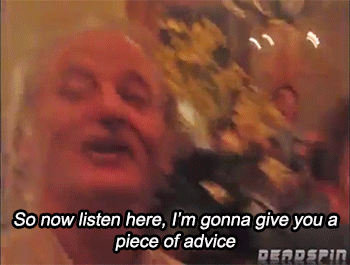
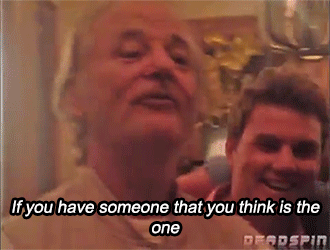

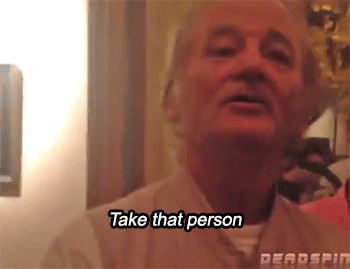
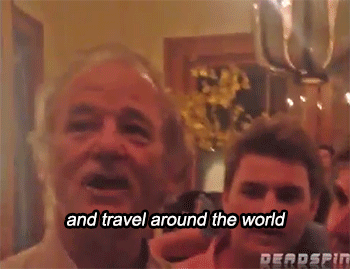
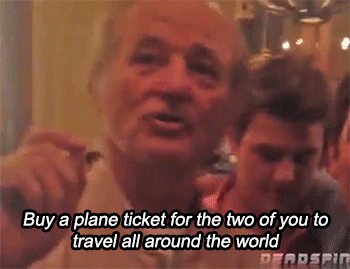
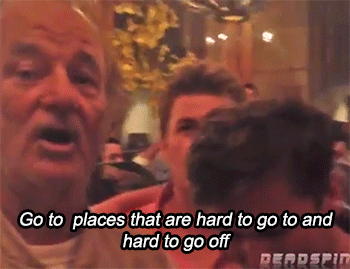
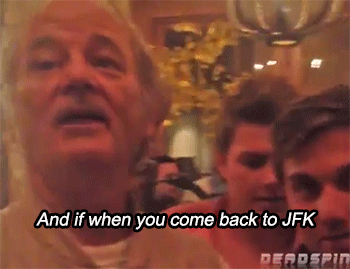
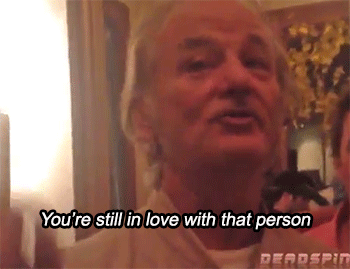
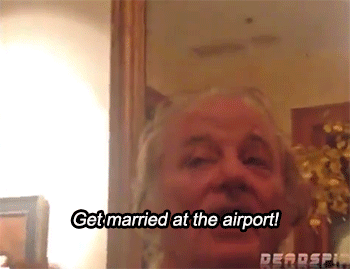
Bill Murray Crashes Bachelor Party, Gives Awesome Speech - Video
Waiting is hard but it's better than having nothing to look forward to.
Breaking the Ice
For about half a year I've been stuck. I haven't written a single word worth mentioning. And that's a problem if you're trying to write something. I had a conflict that I had to rewrite before the climax of my story and nothing worked. I resolved I would not progress with he whole novel as long as this problem is not solved and today, with pride I say, I have solved it. It's possibly the sweetest, neatest, greatest, most dynamic, most intense part of the whole thing.
But why couldn't I write it? I've been in a bittersweet relationship with the Creator of everything. Last time in church, the scripture said that what the Lord requires of me is:
to try to live in love,
to live according to His laws,
and to be humble toward Him.
None of the above has been fulfilled lately. But He reached down to me and, so openly, he set the rules for me. I was finally told exactly where I'm lacking. Everywhere, apparently. But it's good, it's really the best. I finally know that I should do these three. And I'm so thankful! Knowing this is salvation. I'm saved... once more. This is the biggest thing of my life and now that it's done--not for the first time, sadly--life can/must move on for me. Move forward ;)
-
 blocodeespantamentos liked this · 6 years ago
blocodeespantamentos liked this · 6 years ago -
 alisonayan3-blog liked this · 6 years ago
alisonayan3-blog liked this · 6 years ago -
 celebrateasimplelife liked this · 9 years ago
celebrateasimplelife liked this · 9 years ago -
 tisabearwhere liked this · 9 years ago
tisabearwhere liked this · 9 years ago -
 soonrememberedtales reblogged this · 10 years ago
soonrememberedtales reblogged this · 10 years ago -
 songs-and-soul reblogged this · 10 years ago
songs-and-soul reblogged this · 10 years ago -
 electricorchids liked this · 10 years ago
electricorchids liked this · 10 years ago -
 sweetsweetsurrealism reblogged this · 10 years ago
sweetsweetsurrealism reblogged this · 10 years ago -
 joshuajadon liked this · 10 years ago
joshuajadon liked this · 10 years ago -
 joshuajadon reblogged this · 10 years ago
joshuajadon reblogged this · 10 years ago -
 rawr-booklover reblogged this · 10 years ago
rawr-booklover reblogged this · 10 years ago -
 binslisa reblogged this · 10 years ago
binslisa reblogged this · 10 years ago -
 binslisa liked this · 10 years ago
binslisa liked this · 10 years ago -
 designis4lovers liked this · 10 years ago
designis4lovers liked this · 10 years ago -
 allyfromearth liked this · 10 years ago
allyfromearth liked this · 10 years ago -
 stepoffjollyman liked this · 10 years ago
stepoffjollyman liked this · 10 years ago -
 good-morning--starshine reblogged this · 10 years ago
good-morning--starshine reblogged this · 10 years ago -
 good-morning--starshine liked this · 10 years ago
good-morning--starshine liked this · 10 years ago -
 jansenlee reblogged this · 10 years ago
jansenlee reblogged this · 10 years ago -
 lorienkittybooks liked this · 10 years ago
lorienkittybooks liked this · 10 years ago -
 mich-nannarone reblogged this · 10 years ago
mich-nannarone reblogged this · 10 years ago -
 mich-nannarone liked this · 10 years ago
mich-nannarone liked this · 10 years ago -
 bybookorbynook reblogged this · 10 years ago
bybookorbynook reblogged this · 10 years ago -
 141beachstreet liked this · 10 years ago
141beachstreet liked this · 10 years ago -
 rookie-rebel reblogged this · 10 years ago
rookie-rebel reblogged this · 10 years ago -
 maryberry-xo liked this · 10 years ago
maryberry-xo liked this · 10 years ago -
 curlcutter liked this · 10 years ago
curlcutter liked this · 10 years ago -
 la-knight reblogged this · 10 years ago
la-knight reblogged this · 10 years ago -
 between-awake-and-dreaming reblogged this · 10 years ago
between-awake-and-dreaming reblogged this · 10 years ago -
 drearlightofzoo liked this · 10 years ago
drearlightofzoo liked this · 10 years ago -
 myrememberies liked this · 10 years ago
myrememberies liked this · 10 years ago -
 perladivenezia reblogged this · 10 years ago
perladivenezia reblogged this · 10 years ago -
 lacremerasta-blog reblogged this · 10 years ago
lacremerasta-blog reblogged this · 10 years ago -
 all-we-are-is-bad-kids liked this · 10 years ago
all-we-are-is-bad-kids liked this · 10 years ago -
 thebeatandthebook reblogged this · 10 years ago
thebeatandthebook reblogged this · 10 years ago -
 thebeatandthebook liked this · 10 years ago
thebeatandthebook liked this · 10 years ago -
 mostlyvoided reblogged this · 10 years ago
mostlyvoided reblogged this · 10 years ago -
 leabharlannai liked this · 10 years ago
leabharlannai liked this · 10 years ago -
 the-bookish-wanderer reblogged this · 10 years ago
the-bookish-wanderer reblogged this · 10 years ago -
 mybelovedlilycat liked this · 10 years ago
mybelovedlilycat liked this · 10 years ago
I mostly write. Read at your leisure but remember that my posts are usually produced half-asleep and if you confront me for anything that came from me I will be surprisingly fierce and unforeseeably collected. Although I hope we will agree and you will have a good time.
213 posts